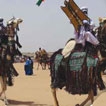January 01, 2023 by Dan Karami Hassane
DMM Jumps to Another Desert Tribe

Five years ago, you could count believers among the Tuaregs in Niger on your fingers. Now there are hundreds. God’s face is turning toward the Sahel. Although this tribe has been overlooked for a long time, the Gospel is now spreading rapidly among them, already at two generations of churches. The second generation are even more active than the first in reaching out beyond natural or normal places.
We discovered there is an oral Bible in their mother tongue (Tamashak), and after discovering God through Scripture in their own language a group of young Tuaregs received Christ, which was very empowering for them. Fifty of these young Tuaregs were working for Arabs, tending their herds. The day after they received Christ, they were visibly joyful when they went to their workplace.
The boss asked them: “Why are you so happy today?”
They said, “We discovered Jesus! We are all Christians.”
The boss asked, “You are Christians?”
They said, “Yes.”
He responded: “You are all fired. We don’t want you working here. We can’t continue to work with somebody who is a Christian.”
T
hey said, “Okay,” and went back home joyful.
Their parents had also come to faith in Christ. They said, “No problem. We’ll have you take care of our cattle.”
When the young men went the next day to water their families’ animals, the boss was there at the well.
He asked, “What are you doing here? We fired you!”
They said, “These animals belong to our parents. We just want to get water for them.”
The boss said, “No. There’s no way that you as Christians can have water from a well dug by a Muslim leader.”
So they went back home. Their parents told them, “It’s okay. Jesus will take care of us.”
The next time I visited, one of the chiefs said to me, “Hasan, we have a problem here,” and he explained it to me. Then he added: “But we prayed, and we remembered what you told us about the story of the woman at the well. Jesus promised that if you believe in him, there will be a source of water. We believe a source of water will come. We prayed, and this is what we believe. Do you want to join us in prayer?”
This was a very hard question for me to answer. These were new believers in the desert, believing that water would come, when they had been denied water because of Christ. I took a big step of faith to say, “Yes, let’s pray together,” and we asked God to provide a source of water.
When I returned to my home base in Niamey, I received a message saying, “Somebody has found some funds for digging a well. Do you have a place where people are really in need of water?”
I said, “Yes! Tomorrow I will go back there,” (though it was a trip of 1200 kilometers). “Keep your money, but send me those who are drilling wells. We want water.”
Less than six months later, when water came, the young men who had been fired went to the Arab camp and told them: “We want you to know that Jesus dug a well for us: not just one, but two. These wells are for Christians, for Muslims, and even for those who have no religion— because Jesus died for all people.”
During a training after that, I asked them during a break about the state of their relationship with these Arabs. They said, “It is good. When the wells were finished, we went to see them and told them that the wells are there, with no restrictions on their use.”
I said, “This is provocation! Why are you telling them, ‘You denied us water, but now we have water available for free?’”
They said, “It’s not provocation. We went with a good heart. We don’t want to cut off any relationship with them because they tried to get rid of us. We want them also to discover Jesus. It’s not just for this group. We are aiming for all the other Arabs in Northern Niger. We know that if they become believers, they have more opportunities than us to reach their own people. This is why we want to maintain a relationship with them.
Now these young men have started three churches among the Arabs. I don’t know of any other Arab church in Niger besides the Arab churches planted by these Tuaregs. Actually, they started one church, and an Arab in one of those churches said, “We want to take this message of the Gospel to some other camps.” This is how it’s spreading. So I believe in the power of DMM and DMM principles, especially when people are connected with God.
As we develop leaders, we make sure they are connected with God through prayer, worship, and reading the Bible. We encourage them to worship God in their own way, in their local language. We want them to connect with people around them, opening opportunities to find the person of peace and continue the work. They are not just disciples, but harvesters. They want to take the Gospel not only to their own people, but also to neighboring groups. We now have some taking the news to countries to the north. This is the Lord’s doing.


comments